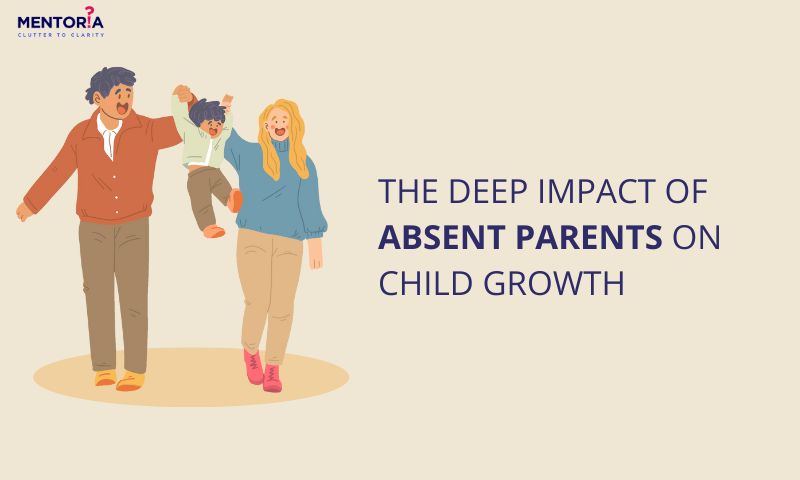The Deep Impact of Absent Parents on Child Growth

Jump to Section
A parent’s absence can dramatically impact a child’s development, reshaping the fundamental framework of their growth. This absence can create a permanent hole that affects a child’s future relationships, self-perception, goals, and well-being. This article examines the complex effects of missing parents on a child’s development, focusing on the long-lasting emotional, psychological, and social impact. We’ll also discuss some coping strategies and resilient paths that emerge amid such significant familial absences.
Psychological Impact: Understanding the Emotional Toll and Offering Solution
The absence of a parent is a distressing chapter in a child’s life, burdened with emotional and psychological impacts that ripple through their mental landscape. Emotions such as abandonment, loss, and yearning can become companions, shaping the child’s perception of self and the world. An individual’s sense of security and attachment is disrupted, which often results in increased vulnerability and anxiety. Generally, a child’s psychological experiences have ramifications that extend beyond their childhood, affecting relationship development and self-esteem.
The following options help to aid children in coping with this turmoil:
- Open communication, providing a safe space for expression, and acknowledging their feelings offer solace.
- Engaging in age-appropriate conversations about the absent parent and validating their emotions to help foster understanding.
- Encouraging healthy outlets such as art, play, or counselling enables them to process complex emotions.
Offering unwavering love and reassurance helps children navigate the emotional terrain, promotes resilience, and nurtures their mental well-being.
Behavioural Patterns: How Absenteeism Shapes Behaviour
The absence of a parent can significantly impact the behavioural pattern in children. Studies repeatedly highlight the relationship between parental absence and the emergence of discrete behavioural patterns, each serving as a distinctive coping strategy. Excessive aggression is a typical pattern that stems from frustration or the need to get attention that is noticeably missing. Conversely, disengagement and emotional detachment frequently occur due to an internal battle to fill the hole left by the missing parent. Additionally, attention-seeking behaviour may surface as children yearn for recognition and affirmation in the absence of a crucial parental figure.
Addressing the complex behavioural patterns in children coping with absent parents requires a comprehensive and compassionate approach similar to the ones below.
- Along with the open communication as mentioned above, creating a stable and predictable environment contributes to a sense of security, mitigating the impact of withdrawal or emotional detachment.
- It is possible to curb aggression by providing outlets for expressing frustration through activities or counselling that channels their energy positively.
- Nurturing a supportive network of caregivers, teachers, and peers who offer assurance and recognition can help address attention-seeking behaviours.
Academics: The Link Between Parental Involvement and Educational Success
The absence of a parent significantly influences a child’s academic journey. Research consistently demonstrates a correlation between parental absenteeism and educational outcomes. Children facing parental absence may encounter challenges such as reduced motivation, lower self-esteem, and a lack of consistent academic support. It can result in poor academic performance, lower grades, and an increased likelihood of dropping out. The psychological damage can also impair a child’s focus, learning motivation, and capacity to establish high educational standards. It can ultimately lead to loss of life’s purpose and direction.
To help children overcome academic obstacles, it is crucial that community engagement initiatives are undertaken apart from the steps mentioned below to create a sense of belonging and shared responsibility in supporting children’s academic endeavours.
- Implementing regular counselling sessions to address the emotional impact of parental absence on a child’s academic well-being.
- Collaborating with educators to create individualised educational plans and offer assistance that cater to the specific needs and challenges of children dealing with parent absenteeism.
- Promoting participation in extracurricular activities to enhance social skills, self-esteem, and provide a holistic approach to education.
- Introducing career guidance and mentorship programmes to inspire children toward setting and achieving realistic educational aspirations.
- Advocating for increased access to educational resources, scholarships, and opportunities that empower children to pursue higher education.
Social Relationships: Navigating Friendships and Familial Bonds
A parent’s absence can significantly impact a child’s capacity to establish and maintain relationships. It can cause emotional voids and alter sibling dynamics, making comprehending and managing familial relations challenging. Children may struggle to develop trust or battle with feelings of abandonment. The effect may spread to peer relationships and friendships in social circles. Children may struggle to form secure relationships, and as they negotiate the complexity of social relations, they may express aggressive tendencies, attention-seeking behaviours, or disengagement.
Caretakers and the community can help create a supportive environment that fosters healthy connections and social development for these children by embracing the strategies mentioned below:
- Introducing positive role models within the family or community can provide children with guidance and support, helping to fill the void left by the absent parent.
- Implementing programmes focusing on social skill development helps children build confidence in forming relationships and navigating social interactions.
- Encouraging community involvement and extracurricular activities provides children with opportunities to form friendships and expand their social circles.
- Collaborating with teachers, mentors, and other supportive adults ensures that children have a network of individuals who understand their unique circumstances and provide consistent support.
Identity Formation: The Search for Self in the Absence of a Parent
Childhood is when the fundamentals of identity and self-worth are knitted together, and an absent parent throws off this delicate web. Children often internalise the absence as a reflection of their self-worth and struggle with issues about their significance. This process may impact the development of self-confidence and a substantial self-concept. Identity formation becomes even more complicated when kids try to figure out who they are in the world without the support and supervision of a critical parental figure.
To help them overcome this, the following steps must be taken to assist them in coping with parental absence:
- It is essential to provide a supportive atmosphere that offers an opportunity for self-discovery, positive role models, and alternate sources of advice to move through these complications.
- Engaging in open communication, encouraging self-expression, and promoting a sense of belonging within communities can help mitigate the impact of parental absence.
- Stress the value of belonging and community, reiterating that children are valuable regardless of the absence of their parents.
How Mentoria Can Help
One can mitigate the adverse effects by acknowledging these challenges and implementing proactive solutions. Ultimately, the collective efforts of society and caregivers play a crucial role in shaping a nurturing environment that empowers children to overcome obstacles and thrive.
At Mentoria, we offer a supportive counselling network to help children navigate their passions and skills along with their personality to provide them with tailored advice.









